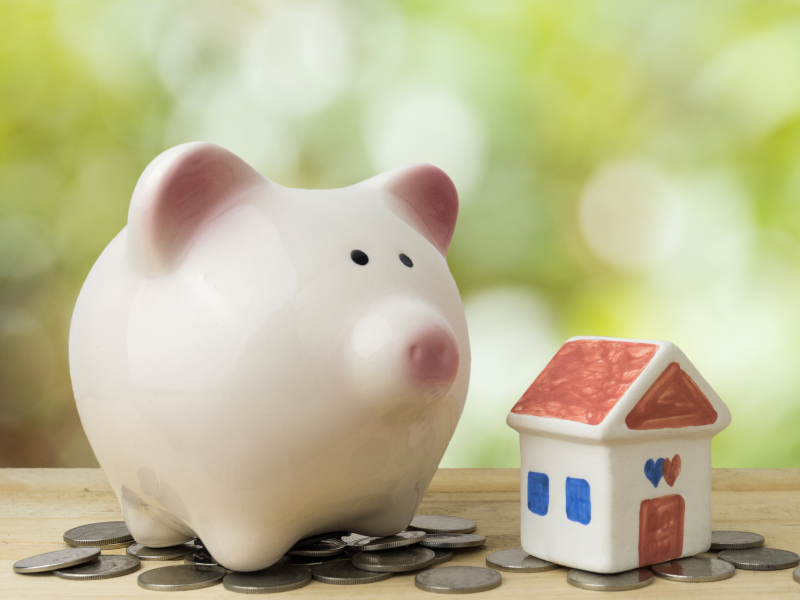How Much Should Your Down Payment on a First House Be?
by Kevin Sun
It’s normal to feel pressured to get a down payment when you’re a first-time home buyer, especially when interest rates are low and house prices might be rising. You may have already researched great ways to save a down payment, but a trickier question is just how big that amount should be. Worrying about what Canadians usually put down or obsessing over getting into the market ASAP can lead to big financial regrets down the road. Instead, decide on a down payment that fits your goals while meeting your needs as well.
What the Minimum Down Payment Is and Why It Doesn’t Work for Everyone
The minimum down payment on a house in Canada starts at 5% for properties that cost up to $500,000, and how much you need for a down payment goes up from there. When deciding whether to rent or buy, many people think of buying as putting 5% down and mortgaging the other 95%. After all, it can take many years of diligent saving to get that 5% saved up. Rising prices can also add pressure to buy. The biggest fear for many is that a property they can put a 5% down payment on now might soon become out of reach – even if they keep saving money at the same rate as before.
These are all very real concerns. However, don’t let the fear of missing out on home ownership pressure you into debt you can’t afford. The fact is that the biggest expense of buying a house isn’t the down payment – it’s the regular costs you’ll have with homeownership. Those go well beyond the mortgage payment; they also include property taxes, strata fees, utilities, insurance, and maintenance.
The bottom line is that making the minimum down payment will maximize your mortgage debt. This isn’t only because of the higher mortgage, but also because you’ll have to pay the highest mortgage loan insurance premium as well. When you add that to all the other costs of a home, it just doesn’t work for many who are already pushing the limits of what they can afford. Getting into the housing market is great, but forcing yourself in and then getting forced out because you got behind with payments is the worst outcome.

How to Get Assistance with Buying a Home for the First Time
Buying your first home is a great financial achievement, and there’s nothing wrong with getting help to accomplish it. One option every Canadian has is the Government of Canada’s first-time home buyer incentive. How this works is that the government will give you either 5% or 10% of the property you’re buying to put towards your down payment. Doing this will lower your mortgage payments. However, it also means that the government will own 5% or 10% of your home’s equity, which you must repay after 25 years or when you sell. There are other costs to this incentive as well, so get the full details from your lender before deciding if you’ll use it.
Another way to get assistance with home-buying is to buy with someone else. The power of multiple incomes can’t be underestimated, and working with your partner has many money management benefits. Parents who are currently doing well financially may also choose to gift part of the down payment to their children. The downside is that this can put a big burden on the parents, especially if they’re still saving for retirement. Instead of a gift, a joint mortgage is another option where the co-signers can split both the property’s costs and its equity. However, as with all joint debt, every co-signer is 100% responsible for making sure that 100% of the payments happen. Doing this will also lead to a complex tax situation, so make sure that everyone involved gets independent advice from an accountant and lawyer before committing to anything.
Alternative to Make Home Ownership Happen
The Best Down Payment You Can Make
Whether you get help or go it alone, the best down payment on a house is the one that gets you the best mortgage. So what’s the best mortgage? The one that fits your budget. After getting pre-qualified so that you know the maximum mortgage you can be approved for, go back to your budget to figure out the maximum payment that really works for you. This is important because it’s very possible to get approved for a mortgage that your budget can’t handle. Instead of defaulting to the loan limits your lender offers, think critically about your overall financial situation, including your income, current monthly & yearly expenses, savings, and debts.
How to Check If Your Mortgage Payment Will Be Too High or Not
A good, risk-free way to check what you can handle is to “try on” a mortgage. For example, let’s say that Bill pays $800 a month to rent a place right now. He wants to buy a house and thinks that his budget could fit $1500 a month for this, including the mortgage payment and other housing costs like property taxes, strata fees, insurance, and utilities. To check if he’s right, he spends the next 6 months putting an extra $700 away into his savings while still renting for $800. At the end of the 6 months, he’ll know for sure if he can handle the higher monthly expense, not to mention the extra $4800 he now has to put towards buying a place of his own!
The mortgage that fits your budget should be what decides which home you buy and how much of a down payment to make, not the other way around. It can be tempting to pour all your savings into a down payment, but keeping an emergency fund is always important – especially when you’re moving into a new home. And don’t forget about all of the costs that come with the actual purchase, moving, and setting your new place up with the furnishings you like.
How to Improve Your Budget to Help with Buying a Home
Just as others can help you get a down payment on a house, a non-profit credit counselling organization is a great resource that can help you figure out and improve your budget. It’s also important to get second opinions when making a big financial decision like this, and a credit counsellor would be happy to offer you their professional assessment in a free and confidential appointment. Contact a non-profit credit counselling organization in your area today to learn more, and good luck with the house hunting!



Great insights on planning your down payment! This will definitely help first-time buyers make smarter choices.